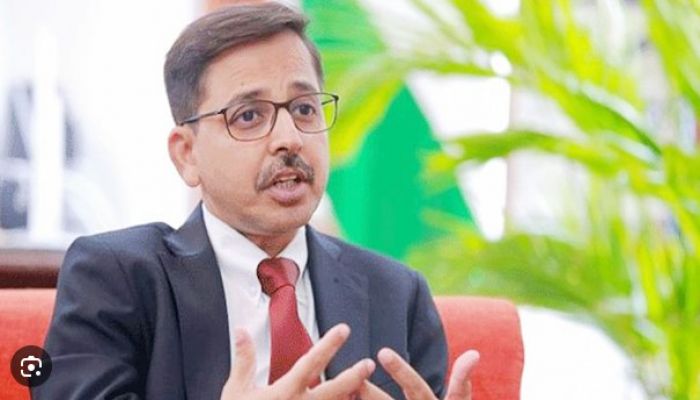
Desk Report
Publish: 13 Feb 2024, 04:31 pm

Indian High Commissioner To Bangladesh Pranay Verma. Photo: Collected
Indian High Commissioner to Bangladesh Pranay Verma has said the future of Bangladesh-India partnership lies in efficient multimodal connectivity encompassing road, rail, inland waterways, and coastal shipping.
"Our connectivity philosophy is simple. It is about transforming our geographical proximity into new economic opportunities for both our countries and for the entire region," he said.
The High Commissioner said their connectivity agenda goes beyond just physical connectivity. "It includes energy connectivity and digital connectivity as well."
Over the last two consecutive years, India has emerged as the largest destination for Bangladesh's exports in Asia, having crossed 2-billion-dollar mark, said the High Commissioner at the inaugural ceremony of the Sultanganj, Godagari Port of Call and the flagging-off of a cargo vessel from Sultanganj to Maia on Monday.
A similar vessel was flagged off from the Indian side, from Maia to Sultanganj.
"The fact that the economies of both Bangladesh and India have grown at high rates during the same time that our connectivity links have grown, empirically proves that greater inter-linkages between our economies have mutually rewarded and reinforced each other's growth," he said.
He described the event as another powerful example of the transformative changes that have taken place in India- Bangladesh relations under the visionary leadership of Prime Minister Sheikh Hasina and Prime Minister Narendra Modi in the last ten years.
"This transformation is most clearly visible in the rapid growth of our economic engagement and our connectivity links," said the High Commissioner.
With strong political will on both sides, he said, they are rapidly changing the connectivity landscape between India and Bangladesh.
"With our contiguous geography and shared history and culture, we are actually re-connecting our two countries," the High Commissioner mentioned.
The Protocol on Inland Waterways Trade and Transit (PIWTT) is helping to move forward in using the river systems of India and Bangladesh to mutual benefit.
"The re-opening of Maia-Sultanganj route shows our determination to move towards even greater utilization of the river transport for trade and travel," said the Indian envoy.
Bangladesh and India are constantly making strides to become economically stronger. Bangladesh is aspiring to become "Smart Bangladesh", a developed country driven by knowledge economy by 2041. India is determined to become "Viksit Bharat" joining the ranks of world's developed economies by 2047.
"These overlapping visions of development create new opportunities for our cooperation built upon our new capabilities and new aspirations," said the High Commissioner. Some studies indicate that seamless transport connectivity, along with improved trade and transport regulations and infrastructure between India and Bangladesh, has the potential to increase Bangladeshi exports to India by almost 300%, Verma said.
"As Bangladesh makes the important economic graduation to become a developing country in 2026, we look at Bangladesh as an even more valuable economic partner," he said. In this new context, Verma said, they are going to soon start negotiating a Comprehensive Economic Partnership Agreement (CEPA) through which both countries will be able to harness each other's growing potential to mutual benefit.
Improving connectivity and promoting multimodal connectivity is the key to unlock the true potential of our cooperation and take our economic, cultural and people- to-people connections to a new era commensurate with the 21st century hopes, expectations and aspirations of our people, he said, adding that better connectivity is central to improving the ease of doing business and the ease of living, both key priorities of current leaderships.
The High Commissioner reiterated that Bangladesh and India share a unique and special relationship that unlike any other bilateral relations. "It is more than a strategic partnership. Our ties are linked by shared history, language, culture and deep mutual empathy. They are based on shared values and interests," said.
But most importantly, High Commissioner Verma said, they are rooted in shared sacrifices during the Liberation War of 1971.
"Our connectivity initiatives are also guided by that same spirit of mutual empathy and interdependence centered on the welfare and well-being of our peoples and our future generations," he said.
UNB
Subscribe Shampratik Deshkal Youtube Channel
© 2024 Shampratik Deshkal All Rights Reserved. Design & Developed By Root Soft Bangladesh